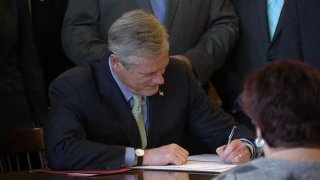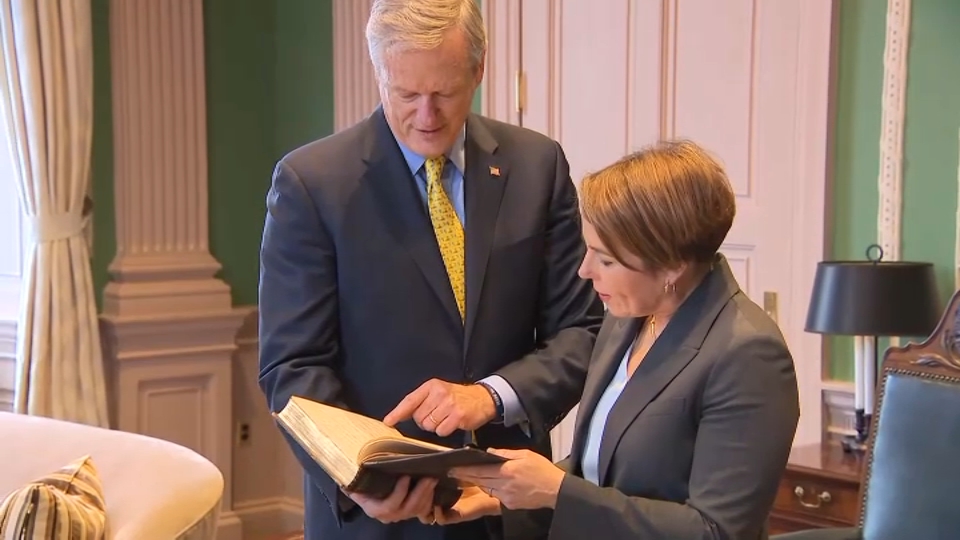
Massachusetts Gov. Charlie Baker may need a backup bill-signing pen for his final full day in office.
Over the course of 13 hour-sessions to close out the 2021-2022 lawmaking term, the House and Senate worked together to pile more than five dozen bills on Baker's desk, including legislation clarifying foster parents' rights and expanding MassHealth coverage for postpartum care.
Most of the bills that secured final enactment votes Tuesday or very early Wednesday were local in nature. Almost all of them have been pending for weeks, months or more than a year, but lawmakers left them right up until the very end.
The stretch of lawmaking right before the finish line is also littered with bills that got close, but not close enough, in one or both branches, including a measure to crack down on dissemination of sexually explicit material without a subject's consent, often referred to as "revenge porn."
Nearly every other state besides Massachusetts has a clear ban on revenge porn in place, and strengthening prosecution of that offense for years has been a priority for Baker and Lt. Gov. Karyn Polito. The House unanimously approved a bill (H 4498) in May and the Senate surfaced and advanced its own version (S 3167) on Thursday, giving supporters hope that the measure would finally succeed, but the House never took action on the changes the Senate made before the term drew to a close around 12:30 a.m. Wednesday.
Like they will need to do for all other bills fell short of earning Baker's signature, legislators who want to rein in revenge porn in Massachusetts will need to reboot the lawmaking process from the first step in the 2023-2024 term.
Other bills that appeared to be in the mix Tuesday but ultimately faltered include a measure seeking to require the state's chief medical examiner to provide additional review in cases involving the deaths of children younger than 2 years old (H 5422) and an effort to expand access to naloxone (S 3182).
The House approved the medical review bill in December after unsuccessfully attempting to attach similar language to the state budget, and the Senate approved the bill Tuesday evening, but the branches did not take the final votes needed to get it to Baker's desk.
Supporters of the reform argue those cases are sensitive enough to warrant the additional review and expertise the chief medical examiner would bring, pointing to charged cases such as the 2013 death of Rehma Sabir where an examiner changed their autopsy results after initial publication.
Meanwhile, the Senate on Tuesday evening also approved a bill requiring doctors to prescribe the opioid overdose antagonist naloxone alongside opioids.
Under the bill that fell short, doctors would need to offer a prescription for a naloxone if the patient has taken a benzodiazepine in the past month or was prescribed one in the same visit, or if the patient has an increased risk of overdose, including a history of substance use disorder.
The legislation also stipulated that when doctors prescribe opioids, they should educate patients on overdose prevention and how to use an antagonist drug such as naloxone. If a patient is a minor, doctors would have to teach their parent or guardian how to use the antagonist.
The bill did not emerge in the House for a vote.
Baker will get roughly another 35 hours to stamp his approval on all of the bills he wants to become state law. Anything he does not sign before he leaves office will effectively die, and supporters will need to restart the lawmaking push from the beginning in the new term.
That also gives Baker another option for spiking bills, often referred to as a pocket veto: rather than issue a formal rejection and send that back to the General Court, he can just take no action and let the clock do the smothering since the Legislature that crafted the bills no longer exists and has adjourned "sine die."
The Republican governor already figures to have a busy day on Wednesday before he dives into the stack of legislation on his desk. He plans to help swear in the new House and Senate in the morning, host Gov.-elect Maura Healey in the corner office for a traditional symbol exchange in the afternoon, then take his symbolic "lone walk" out of the State House and back into civilian life in the evening.
Baker may wrap up his official business before that lone walk, although he will technically remain governor until Healey takes the oath of office on Thursday.
One of the bills that landed on Baker's desk seeks to create a "Foster Parents' Bill of Rights" (S 2980) that would instruct the Department of Children and Families to craft a clear policy outlining its relationship with foster parents and the options foster parents have as they navigate the system.
The bill requires DCF to communicate with parents about available payments and other financial aid they may receive for fostering, develop a standardized "pre-service training" for foster parents, and provide foster parents with information about a foster child's physical and behavioral health, history of trauma and high-risk behavior, and education needs before placement.
Additional measures lawmakers sent Baker during their final session include a bill imposing new record-keeping regulations in transactions involving motor vehicle catalytic converters (H 5356) and a bill keeping eligible Bay Staters on MassHealth coverage for 12 months beyond the end of a pregnancy (S 2731).
Both branches gaveled out "sine die," using the Latin phrase "without a day" to mark that they ended the service of the 192nd General Court. When the House and the Senate meet again on Wednesday, they will begin the 193rd General Court.
The day will feature many of the usual ceremonial gestures and leadership elections whose results are effectively predetermined, but it will also involve an unusual step: two people elected as representatives will not take office.
House Speaker Ronald Mariano announced Tuesday night he would postpone the swearing-in of Rep.-elect Margaret Scarsdale of Pepperell and Rep.-elect Kristin Kassner of Hamilton, both of whom won by microscopic margins following recounts.
"While I look forward to swearing in Representatives-elect Scarsdale and Kassner, the House will temporarily delay their swearing in to allow the Special Committee to Examine the Returns to thoroughly review the last minute legal issues raised in each race, and affirm the results of each election," Mariano said in a statement.
Kassner trailed five-term Republican Rep. Leonard Mirra by 10 votes following the election, but a recount flipped her to victory by a single vote. Scarsdale led Republican Andrew Shepherd by 17 votes in the initially certified results, and a recount narrowed her lead to seven votes.
Both Mirra and Shepherd filed lawsuits in the wake of the recounts, alleging that election officials made missteps and that some ballots should have been counted differently or tossed. Shepherd's case remains ongoing, and Mirra filed an appeal last week after an Essex Superior Court judge dismissed his complaint.
Legislative leaders convene special committees to examine vote returns at the start of each two-year lawmaking session. This time around, the speaker also plans to task that panel -- whose members will not be announced until Wednesday -- with looking at the pair of recounts and legal challenges they drew.
The House will operate without two members until that committee finishes its work, which is not expected to happen Wednesday, Mariano's office said.
Scarsdale said in a statement she is "tremendously disappointed" by the decision to push back her inauguration, noting that most of her area has not had any representation in the House since former Rep. Sheila Harrington resigned in February for a judicial post.
"Due to my opponent's eleventh-hour lawsuit and election denialism more broadly, my swearing-in has been temporarily delayed," Scarsdale wrote in a statement she posted to Twitter. "This new and dangerous trend of not just denying election results, but using frivolous, disingenuous methods to delay the certified winner from taking her seat is chilling, and it poses a direct threat to our democratic process and the values we cherish in the Commonwealth and in our great country."



